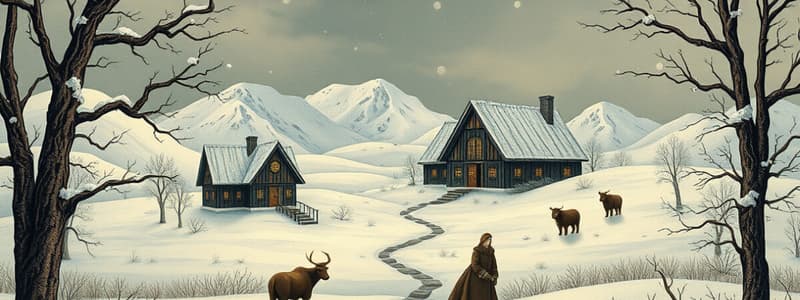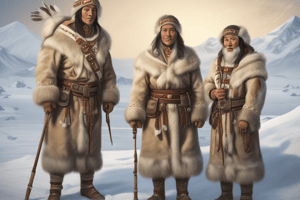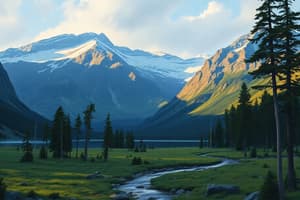Podcast
Questions and Answers
The Arctic cultural region extends throughout the northernmost regions of Canada and ______.
The Arctic cultural region extends throughout the northernmost regions of Canada and ______.
Alaska
The tundra is characterized by cold temperatures and ______.
The tundra is characterized by cold temperatures and ______.
no trees
The people of the Arctic followed caribou into the tundra for ______.
The people of the Arctic followed caribou into the tundra for ______.
food
Many built temporary shelters called ______ out of blocks of snow.
Many built temporary shelters called ______ out of blocks of snow.
In the summer months, people built movable animal-skin ______ for shelter.
In the summer months, people built movable animal-skin ______ for shelter.
Flashcards are hidden until you start studying
Study Notes
Arctic Cultural Region
- Extends through northernmost Canada and Alaska, primarily characterized by tundra climate.
- Tundra experiences cold temperatures, lack of trees, and harsh winter conditions with frequent snowstorms.
- Summer temperatures remain cool, with continuous daylight allowing brightness even at night.
Food Sources and Survival
- Extreme conditions make food sourcing challenging; few plants can thrive in frozen tundra soil.
- Most of the tundra remains covered with a thick layer of permafrost, inhibiting plant survival.
- Limited edible vegetation leads to reliance on animal sources; caribou and other wildlife are vital.
- Seasonal migration patterns exist, with summer hunts for caribou and winter hunts for marine mammals and fish along the Arctic coast.
Settlement Patterns
- Some Arctic inhabitants established permanent coastal settlements, but many opted for a migratory lifestyle to follow food sources.
- Shelter needs varied based on seasonal movement and available resources.
- Movable tents made from animal skins were constructed for summer use, allowing easy relocation with caribou herds.
- In winter, options were limited due to tree scarcity; temporary shelters, known as iglus, were made from snow blocks or partly underground structures of stone or soil.
- Iglus provided warmth during the severe winter climate.
Studying That Suits You
Use AI to generate personalized quizzes and flashcards to suit your learning preferences.




